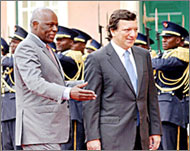Angola Marburg virus toll rises
The death toll in an outbreak of the deadly Ebola-like Marburg virus in Angola has risen to 113, according to health officials.

Three-quarters of the deaths were children under the age of five, according to the UN’s World Health Organisation.
“The death toll is 111 … in the Uige provincial hospital,” Carlos Alberto, a Health Ministry spokesman, told AFP from Uige,
about 300km north of Luanda.
The provincial health director for Luanda, Vita Mvemba, said there were two deaths in the capital.
“We have registered one death at the Josina Machel hospital of a 15-year-old boy who had been to the Uige province … and a case of an Italian doctor, who had also been to Uige, who died on Thursday night in the Sagrada Esperanca clinic,” Mvemba said.
Paediatrician dead
The Italian non-governmental organisation Medici con Africa Cuamm from Rome identified the doctor as paediatrician Maria Bonino, who worked for the United Nations and had been a volunteer in Africa for the past 11 years.
She had been practising for the past two years in the Uige provincial hospital, the organisation said.
|
“The death toll is 111 … in the Uige provincial hospital” Carlos Alberto, |
Alberto said on Friday that a Vietnamese doctor was among those ill with the disease.
“He is not dead,” Alberto said, without giving a precise number of sick in the country.
“The situation is stable. We are continuing to look for active signs in the community, hoping to detect more cases of infected people,” he said.
Mvemba added that five cases of Marburg have been detected in Luanda including the two dead.
One of the sick was at the Josina Machel Hospital, Mvemba said, while “two other cases had been admitted”, one at the Lucrecia Paim Maternal Ward and one child at the Cacuaco Health Centre on the outskirts of northern Luanda.
Related to Ebola
The Marburg disease, a severe form of haemorrhagic fever in the same family as Ebola, was first identified in 1967, affecting laboratory workers in the central German town as well as in Frankfurt and Belgrade who had come into contact with infected monkeys from Uganda.
The largest outbreak on record of the Marburg virus occurred from late 1998 to 2000 in the Democratic Republic of Congo, killing 123 people.
Emergency efforts were under way, and Thursday the European Union pledged 500,000 euros ($650,000) to help fight the outbreak.
The EU money was offered to the Spanish arm of Medecins Sans Frontieres (MSF) to provide protective suits, gloves and goggles, water-purification equipment and tanks, intravenus fluids and antibiotics.
US medical help
Angolan health officials assisted by WHO experts and MSF (Doctors without Borders) teams and the US Centres for Disease Control were in Uige to try to shore up measures to stamp out the outbreak.
 |
|
EU has offered monetary aid to |
Angolan health officials have been battling to contain the outbreak detected in October in the town that has claimed the lives of scores of children.
A total of five nurses have died over the past weeks from the virus that is transmitted through contact with bodily fluids of infected people.
Victims of the Marburg virus can suffer from a severe watery diarrhoea, abdominal pain, nausea and vomiting early on in the illness followed by severe chest and lung pains, sore throat and cough, according to the WHO.
Many cases result in severe bleeding, beginning from the fifth day and affecting the gastrointestinal tract and the lungs, accompanied by a rash, sometimes involving the entire body.